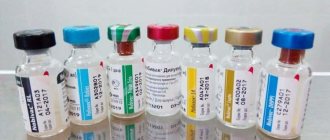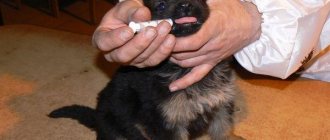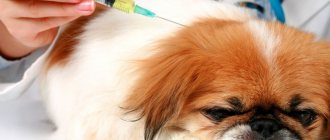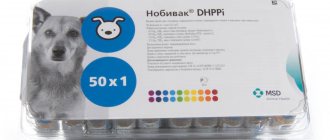The question of why dogs need vaccinations causes the most heated debate among dog breeders. Some categorically refuse to vaccinate their pets, while others, on the contrary, zealously defend the need for this preventive procedure. Owners of Russian toy terriers were also not spared from this discussion. When asked whether or not to vaccinate a dog, the answer is clear: do it.
Why vaccinate your Russian Toy Terrier?
All kinds of viruses and bacteria surround both people and pets. They are everywhere - in the air, food, water, soil, and in the bodies of sick animals. The situation in our country is aggravated by the large number of stray dogs and the low level of vaccination of domestic dogs.
As a result, the risk of contracting dangerous diseases increases significantly. After all, an inquisitive toy terrier is unlikely to resist sniffing another dog during a walk or trying the “delicacy” he finds on his teeth. Even if you exclude your dog from contact with other dogs, there is always a risk of infection, for example, through the dirt that remains on your shoes after a walk.
What diseases are dogs vaccinated against?
All vaccines are divided into mandatory and optional. Mandatory vaccinations include:
- rabies is a deadly disease for both four-legged pets and humans. Once clinical symptoms appear, there is no effective therapy;
- Bordetellosis is an infectious disease of domestic animals. Which fails in inflammation of the bronchi, trachea and lungs;
- Canine distemper is a highly contagious and widespread disease with a high mortality rate, especially among young dogs;
- viral hepatitis - the disease is dangerous for young dogs. Potentially allergenic serums are used for therapy;
- adenoviral infections are a widespread disease, the greatest risk for four-legged pets is acute forms;
- parvovirus enteritis is a highly contagious disease with a high risk of death. The causative virus of parvovirus is highly resistant to physical and chemical influences and remains active in the external environment for several months;
- Leptospirosis is a widespread disease with a high risk of death. Leptospirosis affects not only pets, but also humans.
Additional vaccinations are given from:
- piroplasmora is a common animal disease in Europe and Siberia. The disease develops rapidly as a result of a dog being bitten by a forest tick;
- Lyme disease (tick-borne berriliosis) is a common disease caused by ticks. Berriliosis is potentially dangerous to humans;
- fungal diseases - contagious and common diseases for both animals and people;
- canine parainfluenza - the disease occurs quite often, is transmitted by airborne droplets, and carries the greatest risk for puppies;
- Coronavirus enteritis is a highly contagious disease. A dog can get enteritis from sniffing the feces of a sick animal or from direct contact.
Rabies vaccination
Many dog breeders are interested in whether a Yorkie dog needs a rabies vaccination? They explain their reluctance to vaccinate their puppy against rabies by the fact that they live in a big city, they don’t go anywhere with their dog except in the yard, and no outbreaks of rabies have been recorded in their area.
Read Causes of severe itching in dogs: diagnosis and treatment
But rabies can also be carried by birds, mice and rats, and other domestic animals (stray dogs, cats), so there is always a risk of infection. Moreover, if information appears in the area that cases of rabies have been detected, it will take 12 days for immunity to develop after vaccination, and before that the dog will be especially vulnerable.
It is recommended to vaccinate against rabies first at 3 months (can be done simultaneously with vaccination against distemper, hepatitis, enteritis and leptospirosis), and then again a year or after changing teeth. After which revaccination is carried out annually.
What vaccinations does a terrier need?
The Russian Toy Terrier first of all needs mandatory vaccinations. Beginning dog breeders often wonder at what age terrier vaccinations are required. Approximate puppy vaccination schedule:
- at 3 weeks, vaccination against a group of infections conventionally called “kennel cough” - borderellosis and canine parainfluenza;
- at 4 weeks from canine distemper and parvovirus enteritis;
- at 8-10 weeks from canine distemper, viral hepatitis, parvovirus enteritis, leptospirosis;
- 11-13 weeks (but not earlier than 3 weeks after the previous procedure) again from canine distemper, viral hepatitis, parovirus enteritis, leptospirosis and the first time from rabies;
- annually against canine distemper, viral hepatitis, parvovirus enteritis, leptospirosis and rabies.
For additional vaccinations, the veterinarian develops an individual vaccination plan based on the health status of the four-legged pet.
The first vaccination for toy terrier puppies, as well as subsequent ones, are given in the kennel. Therefore, when buying a Russian Toy puppy, make sure that the veterinary passport contains notes on all mandatory vaccinations.
Blueberry Knights / toy terrier puppies / Russian Toy kennel / Blueberry Nights Russkiy toy kennel
- Tweet
- Tweet
PROTECT YOUR LITTLE FRIEND!
This article will talk about:
- Vaccinations for toy terrier puppies (vaccination of puppies)
- What should a puppy's passport look like?
- Deworming
- Flea and tick treatment
- Annual vaccinations and rules for their implementation
A toy terrier puppy (the official name of the Russian Toy breed) is a rather gentle creature and requires protection!
Protection against most diseases that are fatal to a puppy, and sometimes to humans (rabies), is provided by timely vaccinations (vaccination). And also correct and timely deworming and flea and tick treatment!
1. First VACCINATIONS FOR TOY TERRIER PUPPIES According to the classical scheme, the first vaccinations in a Toy puppy’s life are done in 2 stages. The first at the age of 5-6 weeks and the second repeat at the age of just over two months.
It is very important to understand that the first vaccination does not provide any protection against diseases! She only prepares the puppy for the second vaccination. The period between the first and second vaccinations is one of the most dangerous for puppies . Until the end of quarantine after the second vaccination (10-14 days), strict quarantine must be observed! Avoid contact of the puppy with street dirt and places in the house where street germs can be carried (for example, the hallway)..
For this reason, buying a puppy with only one vaccination is the same as buying a puppy with no vaccinations at all! It is worth keeping this in mind when choosing a breeder and purchasing a Toy Terrier puppy.
The most commonly used vaccines today are combination vaccines from Nobivac, Eurican, and Vangard. The vaccines from these companies are recognized in most countries of the world, which is important for those wishing to travel, and protect the puppy from a whole combination of diseases:
- carnivore plague
- infectious hepatitis
- parvovirus enteritis
- canine parainfluenza
- leptospirosis
Rabies vaccination, which is MANDATORY in Russia, is given to puppies starting at 3 months of age .
- If a puppy/dog is vaccinated against rabies not in combination with other vaccinations, but separately, then it should wait at least 3 weeks after the last vaccination.
- If you do not rule out the possibility of traveling abroad with the puppy in the first year of its life, then the puppy must be CHIPPERED at least DAY before the rabies vaccination, otherwise the vaccination will not be valid in many countries of the world
Disease abbreviations on vaccines look like this and appear in various combinations, depending on the manufacturer:
- DHPPI+L
- DHPPI + RL (R – rabies)
In addition to the above, there are other vaccine manufacturing companies, for example Duramun, Hexadog, etc. However, as mentioned above, when choosing vaccines, it is worth remembering that not all vaccination marks in the passport are recognized as valid in other countries of the world.
Summary:
- Toy terrier puppies are vaccinated twice up to 3 months. In disadvantaged regions - three times.
- You should avoid buying a puppy under 2.5 months old and not vaccinated twice
- if you want to travel abroad with your dog in the future, then pay attention to the vaccine manufacturer
- The puppy must be chipped at least one day before the rabies vaccination
2. TOY TERRIER PUPPY PASSPORT AND VACCINATION RECORDS
Unfortunately, in order to save money and for other reasons, breeders often either do not put vaccination marks in the veterinary passport at all, or vaccinate themselves without having the right to do so.
Keep in mind that officially only veterinary clinics, as well as private veterinarians with permission, have the right to give vaccinations.
At the time of vaccination, the spine from the vaccine bottle is glued into the veterinary passport, the date, signature and seal of the veterinarian and/or veterinary clinic are affixed (Fig. 1).
Only a state veterinary clinic or some non-state clinics and veterinarians have the right to vaccinate against RABIES!!!
The rabies vaccine receipt MUST be certified with 2 SEALS!!! Also, the owner’s data must be entered into the rabies vaccination log, and the registration number must be entered in the passport. (Fig. 2-3) At the time of rabies vaccination, a note about the registration of the animal at the veterinary clinic is also entered in a special section of the passport. (Fig.4)
It should also be remembered that the official quarantine after vaccinations, as well as revaccinations, is 1 month - this is the period during which you will not be able to obtain a certificate to travel or visit an exhibition.
Summary:
- Any vaccination must be noted in the veterinary passport with the date, stamp and signature of the doctor.
- Rabies vaccination requires additional authority from a veterinary clinic or doctor
- Rabies vaccination is certified with two seals and registered in a special journal
3. DEHILMENTIZATION
Newborn puppies are dewormed twice – at 21 days and again after 2 weeks. Moreover, about this procedure, as well as about vaccinations, notes are made in the veterinary passport, indicating the drug and dose. (Fig.5)
An adult city dog should be dewormed 3 times a year (once a quarter) once, including (one of 3) 10 days before the annual vaccination.
Anti-worm medications are available in various forms: tablets, suspensions, pastes.
For small puppies up to 500 grams, it is more convenient to use special suspensions or pastes for puppies - they are easier to dose by weight. For older puppies, you should also purchase special medications for puppies and small breeds of dogs (before purchasing, always check whether the drug can be used for small dogs and whether the dosage is easy to calculate). Among those recommended for toys is the drug Milbemax for small breeds and puppies.
Summary:
- Before the first vaccinations, the puppy must receive anti-worm medications twice, with a note in the passport.
- An adult dog should undergo preventive deworming 3 times a year, including 10 days before the annual vaccination.
4. TREATING THE TOY TERRIER FROM FEAKS AND TICKS.
Everyone knows how dangerous ticks can be! And it’s simply indecent for a domestic toy terrier to be “flea-ridden”!
Therefore, with the onset of above-zero temperatures and the appearance of the first large thawed patches, it is necessary to treat the toy against fleas and ticks and then repeat the treatment once a month!!!
ONCE A MONTH!!!
Currently, there are many popular forms of release: drops on the withers, collars, sprays.
It should be remembered that not every drug is suitable.
Drops at the withers very often have a lower weight limit that exceeds the weight of a standard toy terrier. They are certainly convenient and quick to use, but you should be careful when purchasing them for the reasons described above! Also, when applying drops, the protective effect does not occur immediately, but only after a certain number of hours.
Also, you should not wash your dog a few days before and a few days after treatment with drops.
Collars can be very dangerous if your toy decides to lick or chew on it! There are collars with natural ingredients, but they do not protect against ticks.
In my opinion, the most convenient for a toy terrier are flea and tick sprays! They allow you to dose the drug as accurately as possible by weight and cover the entire body of the animal when applied. The recommended one is Frontline spray 100 ml.
Also an excellent product for lovers of hiking, trips to the countryside and picnics is the natural Greenfort spray. It does not protect against ticks, so it cannot replace basic treatment. But it consists entirely of natural ingredients, mosquitoes and other nasty creatures are really afraid of it, moreover, you can use it on yourself - it’s been tested!)
Toys very often have local allergic reactions to mosquito and insect bites. Therefore, of course, it is better to protect against insects... but if it still fails, then in simple cases drugs like fenistil gel help well. For more serious reactions with swelling, an antihistamine should be given or injected immediately.
Summary:
- Treatment against fleas and ticks should be carried out once a month from the appearance of the first large thawed patches until permanent snow cover is established.
- Try to select a protective product that can be dosed as accurately as possible to the weight of a small dog.
- On walks and outside the city, you can use additional natural remedies to protect against mosquitoes.
HEALTH AND HAPPINESS TO YOU AND YOUR PETS!
Want to know more about life with Russian Toy? Subscribe to our Instagram:
[wdi_feed id=»1"]
ATTENTION! Use of site materials is possible ONLY with the consent of the author and with the obligatory indication of a link to the site! Requests for posting an article can be made through comments.
How much does it cost to vaccinate a toy terrier?
The cost of the procedure depends on several factors. First, the brand of the vaccine manufacturer. Secondly, the location of the manipulation: at home or in the veterinary clinic.
Average cost of vaccinations for a Russian Toy Terrier:
- vaccination with a polyvalent vaccine for dogs (puppies) domestic Biovac, Multakan-4, -6, -8 - at home 1100 rubles, at the veterinary clinic 600 rubles;
- vaccination with polyvalent vaccine for dogs (puppies) imported Nobivak, Vanguard, Duramun, Eurikan - at home 1400 rubles, at the veterinary clinic 900 rubles;
- registration of a veterinary passport - 150 rubles.
Standard vaccination schedule for toy terriers
All vaccinations required for a toy terrier should be done according to a certain schedule at a certain age. According to established rules, it is recommended to give the first vaccination when the pet reaches 6-8 weeks. However, modern drugs can reduce this period to the age of 4 weeks, so that puppies are often handed over to the new owner already vaccinated.
Some breeders vaccinate toy terrier puppies at 3 weeks of age against infectious “kennel cough” (parainfluenza and borderellosis), providing protection to still immature dogs from communicating with older animals in a kennel environment.
Modern combination vaccines such as Nobivak allow one to develop immunity against a number of viruses, including plague and parvovirus enteritis. Revaccination is carried out after 12 weeks.
It is recommended to carry out vaccination against rabies once when the dog reaches at least 12 weeks of age. Thus, by the age of three months, the toy terrier receives all the necessary vaccines to form stable immunity against a number of common diseases.
A note about the vaccination is placed in the dog’s veterinary passport, according to which they are guided by the timing of the animal’s revaccination. Repeated mandatory vaccinations are given once a year.
Rules for vaccination of the Russian Toy Terrier
There are several rules related to vaccination that every toy terrier owner must adhere to:
- Before immunity appears, it is necessary to minimize the likelihood of infection of your four-legged pet. To do this, it is necessary to exclude contacts with foreign animals and walks on the street, strictly observe the rules of hygiene, and ensure that the puppies do not come into contact with shoes and outerwear;
- 2 weeks before vaccination it is necessary to carry out deworming. This must be done because parasites reduce the protective functions of the dog’s body. You also need to check the toy terrier for the presence of external parasites - fleas and ticks. Within 2-3 days before the scheduled vaccination, measure the body temperature of your ward and carefully monitor his health. The temperature should be between 37.5°-39°C. Vaccinations are given only to healthy pets. If your Russian Toy Terrier gets sick, notify your veterinarian, he will create an individual vaccination schedule;
- Monitor the condition and behavior of your ward for several hours after vaccination. If your toy terrier experiences shortness of breath, excessive salivation, or an allergic reaction after vaccination, contact your veterinarian immediately. This may indicate an allergy to the vaccine or individual intolerance to the vaccine. After the procedure, protect your Russian Toy Terrier from all kinds of stressful situations: travel on public transport, contact with other animals, change of diet, tense environment at home, overheating or hypothermia, bathing and other hygiene procedures, physical activity.
The toy terrier will finally develop immunity to the disease 2 weeks after vaccination. During this period, be as attentive as possible to your four-legged friend and his state of health. If you notice changes in your Russian Toy Terrier's behavior or alarming symptoms, notify your veterinarian immediately.
Preparatory activities
- 2 weeks before vaccination, mandatory deworming of dogs of any age is carried out. The presence of intestinal parasites in the body at the time of vaccination can provoke the development of complications, cause the pet to become ill, and also reduce the intensity of immunity to infections.
- Repeated administration of anthelmintic drugs is carried out after 10 days, allowing the pet’s gastrointestinal tract to be completely freed from any remaining parasites.
- In parallel with deworming, treatment for fleas, lice, ticks and other skin parasites is carried out.
- You should also make sure that at the time of vaccination the toy terrier’s coat is clean and the skin is free of scratching, erythema, ulcers, rashes and mechanical damage.
- Until the full course of vaccinations is completed, the puppy must be isolated from communication with other animals. During this period, you should not change his diet and daily routine.
Preliminary inspection
On the eve of your visit to the clinic for vaccination, you need to objectively assess your pet’s condition. You should pay attention to the following factors:
- activity and mobility;
- appetite;
- the presence of discharge from the nasal cavity, eyes, ears, genitals;
- condition of mucous membranes and coat.
Important! Without the skills, you should not try to conduct thermometry on toy terriers yourself. This can lead to rectal injuries and additional stress.
On the day of vaccination, a veterinarian examines the puppy, and only if there are no signs of disease, vaccinates.
How to worm a toy terrier before vaccination
Deworming plays an important role in dog vaccination. Most often, veterinarians recommend using Prazitel for these purposes, since this drug is active against all types of worms.
The drug should be given in the morning on an empty stomach before meals. Prazitel for puppies and small breed dogs is available in tablets and suspensions. For Russian Toy Terriers, a suspension is better. Firstly, in this form the drug is easier to give to the dog, and secondly, it is easier to calculate the dose for the dog.
Dosage of Parasite in suspension for puppies and small breed dogs:
- 1 ml per 1 kg of dog weight.
If your Russian Toy Terrier weighs less than a kilogram, then the dose should be reduced accordingly. For example, if a dog weighs 800 grams, then its dose of Parasite is 0.8 ml. Please note that the drug should not be given to puppies under two weeks of age.
To give your Russian Toy Terrier medicine, draw the required amount of suspension into a syringe (for small doses, a 1-cc or insulin syringe is suitable, just don’t forget to remove the needle). Then, holding your pet's head, part his lips from the side and gently insert the syringe nozzle, then gradually inject the medicine.
Complications after vaccination
In some cases, after vaccination, the Russian Toy Terrier may experience drowsiness, a slight increase in body temperature, and lack of appetite. This reaction of the four-legged friend’s body to the vaccine is considered normal and the symptoms disappear within a few days.
In rare cases, toy terriers experience complications after vaccination:
- redness and itching at the vaccination site;
- severe weakness;
- increased salivation;
- pallor, and eventually blueness of the mucous membranes;
- dyspnea;
- loss of consciousness;
- anaphylactic shock.
If you notice any of the above symptoms in your Russian Toy Terrier, contact your veterinarian immediately. To suppress an allergic reaction, give your dog Suprastin, Claritin or Tavegil.
Whether or not to vaccinate a dog is the business and responsibility of every dog owner. But remember that vaccination of puppies and adult Russian Toy Terriers is the only effective preventive measure against deadly diseases.
Preparing your Yorkie for vaccination
On average, the effectiveness of dog vaccination is about 80-85%. The effectiveness can be affected by both the quality of the vaccine itself and other factors, including the presence of parasites in the dog.
Parasites reduce a dog’s immunity, so a given vaccination may not only not work, but also cause the development of various dangerous diseases. Parasites can also cause an allergic reaction in a dog, which will cause serious stress to its body. Therefore, all veterinarians insist on mandatory treatment of Yorkies for external and internal parasites.
Deworming is carried out before each vaccination. Each drug has its own characteristics and method of use, but usually the scheme is as follows: the medicine is given, then after 2 weeks again, after which you need to wait 7-14 days and you can vaccinate.
It is advisable to vaccinate only healthy animals. Therefore, on the day when vaccination is planned, it is recommended to carefully monitor the pet’s condition: is there any diarrhea or vomiting, is he refusing to eat, or has there been a decrease in activity. Before vaccination, the veterinarian usually conducts an examination and measures the temperature, and if the owner notices something unusual in the Yorkie’s behavior that day, it is better to report it.











